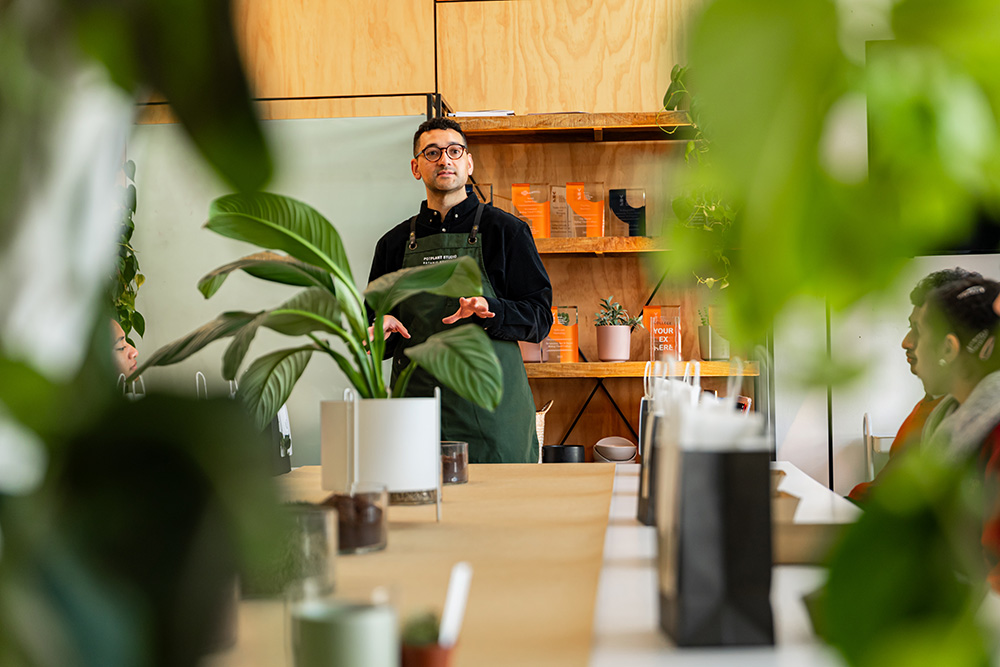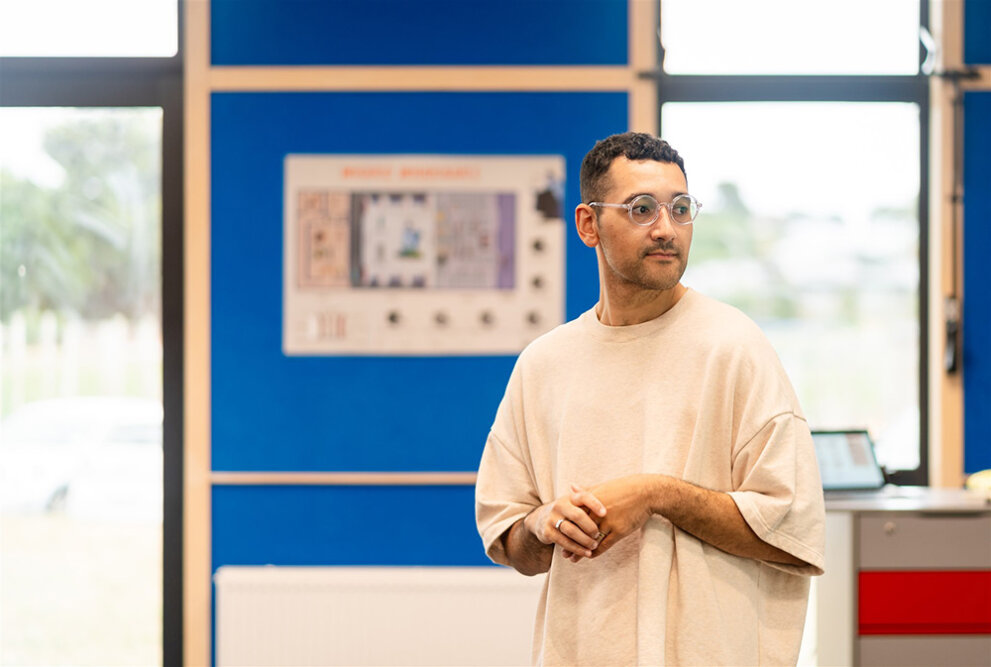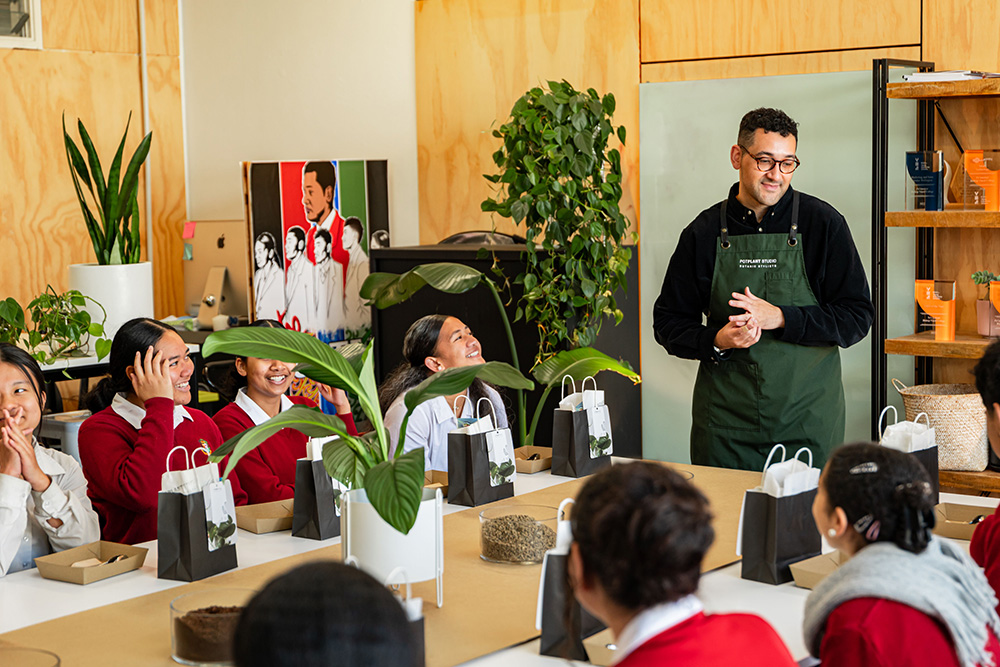
Joshua: "...we use plants to engage young people in conversations that are sometimes tricky and hard to have."
Joshua spent a chunk of his early professional career working with young people, and he knows he’s not alone in trying to figure out who he is in this multicultural existence.
“Being someone who is from multiple cultural realms, it can get confusing. It can bring up some cultural displacement - not feeling like you belong to one or the other, because you essentially belong to both.”
But Joshua isn’t keen to focus on the negative – “historically, that’s happened more than enough”, he says.
“I try and flip it and make it a positive that you can access these multiple cultural realms. It’s something to be more celebrated, especially in the workplace.”
He thinks multicultural kids grow up with such an inherent superpower. They sometimes don’t even realise they have it at their disposal.
“You’re able to whip in and out of different cultural realms in a genuine way, it’s not tokenistic”.
“Trying to explain that to our young people that they can, you know, they should, put that on their CV, that you’re able to engage with multiple cultural communities at any given time. It’s a strength.”
At the end of last year, Joshua started work at the Ministry for Pacific Peoples as a regional portfolio lead in the economic development space, after a stint with global Japanese technology company Fujitsu, where he worked as community partnerships lead for Australia and Aotearoa New Zealand.
He has also been focused on growing a mental health start-up with his wife that uniquely uses pot plants to get rangatahi, youth, talking about their own personal growth, barriers, hopes and dreams for the future.

Joshua believes coming from a multicultural family is a 'superpower' that should be embraced
Imagine turning up to a workshop and getting your hands dirty as you’re talked through how to provide a healthy potted home for a new plant.
The plants can be seen as a metaphor, as is the pot, the good soil, the water, and everything else nurturing it needs to grow well.
“Basically, we use plants to engage young people in conversations that are sometimes tricky and hard to have”.
“We talk about who they are, and we look at mental health, which cultural displacement can be a big part of - understanding who you are and how you fit into the world.”
At the end of the workshop, everyone gets to take their newly-potted plant home.
“It’s kind of random, but it actually gives people so much fun, happiness and joy when they do engage with plants.”
While an original funding contract has been used up, the pair are now working on new revenue streams, including potential business partnerships, to keep the good work going, continuing the positive social impact.
At the Ministry for Pacific Peoples, Joshua is finding his feet in a new role with an economic development focus.
Fresh off a two-month fellowship for Young Economic Empowerment Leaders in Hawai’i and Washington DC, Joshua will be looking at sustainable pathways for growing Pacific businesses. He says it's a great place to put fresh ideas into action.
Joshua is passionate about supporting Pacific people to thrive in business.
He has his eyes firmly focused on the Pacific pay gap.
“In a nutshell, Pacific people are currently the lowest paid corporate demographic in Aotearoa New Zealand.
He thinks one area of potential positive disruptive change lies in utilising “cultural nuances”.
“Pacific people, they’re natural problem solvers. If we give them the right tools they can move in these spaces with such innovation and creativity.”
He also wants to see the normalisation of, and pathway support for, certain career fields in Pacific communities.
“The tech sector is highly under-represented among Pacific peoples, for example, and doesn’t give an accurate reflection of the population across the Pacific and within Aotearoa New Zealand.
“Our Pacific people can’t be what they can’t see.”

Joshua: "Our Pacific people can’t be what they can’t see.”
Joshua is excited to contribute a Pacific lens to the Asia New Zealand Foundation.
In a geopolitical sense, the two regions collide, and historically there’s been cultural mingling for generations – think Chinese influence in Samoa, Indian influence in Fiji, and Japanese and Filipino influence in Hawaii. But the two cultural narratives – Asian and Pacific – can seem less intertwined in Aotearoa New Zealand.
He says he feels a commonality with many of the cultures of Asia because of his own Pacific heritage – growing up with family as the key social unit springs straight to mind.
For him, and plenty of his peers as well, the great Kiwi ‘OE’ didn’t really make sense, and he hasn’t yet spent a stint travelling for the sake of exploring.
“It isn’t something that is normalised as a rite of passage.”
He thinks the concept of “going outside of your own cultural group to experience culture” is a Western one.
“An OE means you go overseas and you have your own overseas experience, right? To do it would mean you leave your family, and for Pacific people to leave your family and not be able to connect or give back or serve is kind of going against how you would be raised.”
He says for some families and communities, the great ‘OE’ is also financially unattainable, seen as something reserved for the privileged.
“Personally, I would never have thought of it.”
The Asia New Zealand Foundation Leadership Network equips New Zealand’s next generation of Kiwi leaders to thrive in Asia. We provide members with the connections, knowledge and confidence to lead New Zealand’s future relationship with the region.


